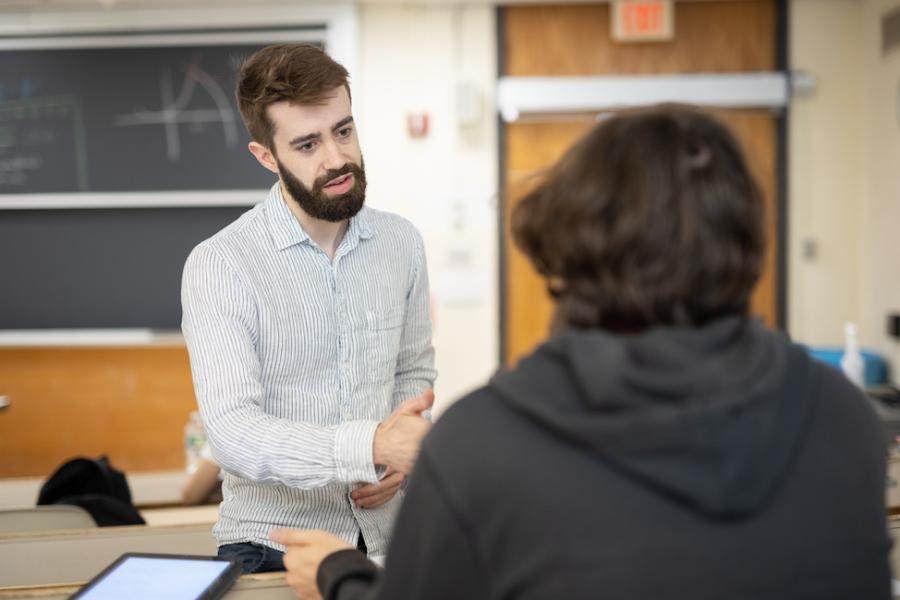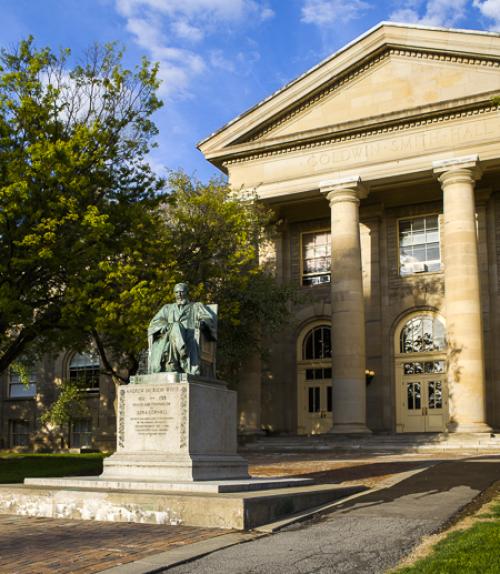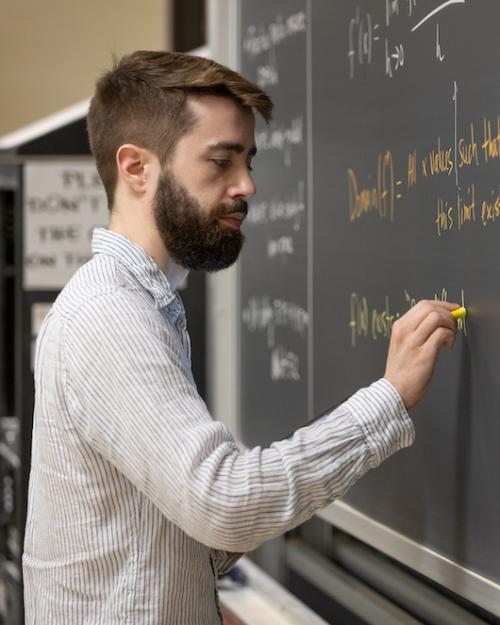Ranking things – like the 100 best chess players in the world – soon gets complicated, especially when not all the participants have played each other yet. While mathematics can provide a helpful framework, it can’t yet entirely solve an open problem, introduced in the 1960s, having to do with rankings.
“The 1/3-2/3 Conjecture makes a specific prediction about how to choose two players to play a game so that the outcome of their game will tell us as much information as possible about the overall ranking,” said Christian Gaetz, a Klarman Fellow in mathematics in the College of Arts and Sciences (A&S). “I think it’s beautiful and important mathematically, and it certainly has applications for certain kinds of sorting.”
Gaetz is using his specific area of focus in mathematics – algebraic combinatorics – to approach a piece of the 1/3-2/3 Conjecture. Gaetz has solved special pieces of the problem, but the full conjecture is still open. It’s one example of how he generalizes things that are known in classical topics to a broader setting, creating bridges between fields of mathematics.
During the three years of the Klarman fellowship, Gaetz is researching algebraic combinatorics. This area of mathematics uses abstract algebra in various combinatorial contexts – such as rankings – and, conversely, applies combinatorial techniques to problems in algebra.
One type of combinatorics problem, one that’s easy to picture, involves permutations, Gaetz said. If we have a set of objects, the permutations of those objects are all the different orders they can be put in.
“If I’ve got three objects, there are six different orders they can be put in: 1, 2, 3; 3, 1, 2; and so on,” he said. “That’s a classical way to think about combinatorics.”
Permutations are one concrete example of a topic related to algebraic combinatorics, Gaetz said. He also works on Weyl Groups; one example of a Weyl group is the set of all permutations of some objects, he said. Weyl Groups have roots in various areas of math, including algebraic geometry and representation theory.
“I’m interested in taking things that are either known about permutations or are open problems about permutations and asking, can we use the tools from these other fields to try and say something about permutations? Can we think about permutations in a bigger context?” Gaetz said. “Conversely, can we use things we understand about combinatorics and permutations to say something useful in algebra? It’s a two-way street.”
“Christian has made remarkable progress on a number of outstanding problems in algebraic combinatorics,” said Karola Mészáros, associate professor of mathematics (A&S) and Gaetz’s faculty host. For instance, Gaetz recently answered a question posed back in 1984 and continued in 2017 by Richard Stanley, a giant in the field of combinatorics, about certain partially ordered sets -- the weak orders -- which appear prominently in combinatorics and computer science. “It was finally Christian, in joint work with a fellow graduate student, who recently proved this beautiful result,” Mészáros said.
Gaetz discovered combinatorics in high school, when he signed up for a college course in the topic. Attending the University of Minnesota, a powerhouse in algebraic combinatorics, gave him even more exposure. By attending graduate school at the Massachusetts Institute of Technology, historically a center of the field, he had the opportunity to become part of the academic family tree of MIT professor emeritus Richard Stanley, who has had a major influence on the field. At Cornell, Mészáros is also part of this academic heritage.
Another Cornell collaborator is Allen Knutson, professor of mathematics (A&S), who has expertise in algebraic geometry.
As a multifaceted researcher, Gaetz fits into the math department in a multitude of ways, Mészáros said. “I expect indeed that he’ll forge many prolific collaborations beyond the easily predictable ones,” she said.
Although teaching is not required as part of the Klarman Fellowship, Gaetz has chosen to teach calculus this summer as professional development.
The Klarman fellowship, he said, has given him great freedom to pursue research, including, perhaps, the 1/3-2/3 Conjecture.
“That would be a dream scenario if I figured it out,” he said. “It’s not good to devote all of one’s attention to something that’s so big, but certainly it would be excellent if I were able to make progress on it.”






